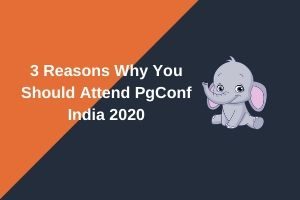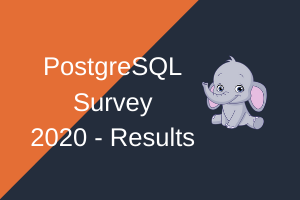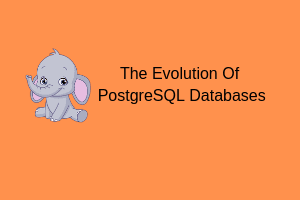Hello Friends!!
It has been just two years since I know the word PostgreSQL.
During my journey into PostgreSQL, I came to know that there is a conference going to happen every year on PostgreSQL in India and we call it PGConf India.
Last year it happened between Feb 13 and Feb 15.
I attended the PgConfIndia conference for all three days and here are my observations and feedback on the conference.
Let me divide my observations into two parts, one with the logistics front and the other with the technical discussion that had happened for three days.
Table of Contents
Technical discussion on PostgreSQL:
It was the three-day conference with Day 1 being training and Day 2 and 3 are dedicated for sessions.
Day 1 (Training Sessions)
Day 1 Session 1 – PostgreSQL Training’s
During the morning, I attended the session on PostgreSQL Performance Tuning and Optimization by Nidhi Bhammar.
Nidhi started off with the basics of PostgreSQL query processing and continued with SQL tuning tips and techniques.
What did I like?
She has explained everything in detail and I could say a layman can understand it easily.
She has covered almost all aspects of performance tuning like
- where to start,
- How to proceed and
- what to check etc.,
What I didn’t like?
Most of the techniques/features that she mentioned are related to EDB version of PostgreSQL and are not available in Community version, as I use the community version of PostgreSQL, I found they are least useful for me.
Day 1 Session 2 – PostgreSQL Training’s
Afternoon, I attended the session on Postgres-BDR: Multi-Master Replication by Nikhil Sontakke
Bi-Directional replication is one of the main reasons that I attended the PGConf India 2019.
Nikhil lived up to my expectations on Multi-Master Replication. With Three and Half hour-long session, He covered everything we must know about multi-master replication.
Few of the topics that he covered include
1. Bi-Directional replication introduction
2. BDR 3 Architecture
3. BDR 3 Setup, Usage
4. BDR 3 Monitoring and Production support.
What did I like?
- QnA during the training.
- Concepts covered.
What I didn’t like?
Nothing, But yeah I expected a demo kind of thing on BDR.
Day 2 (Conference Day 1)
Day two started with the keynote speeches, the first being “PostgreSQL – your migration destination” by Jim Mlodgeski and second “PostgreSQL: The hyper-converged DBMS” by Simon Riggs.
Both keynote speakers gave us insights about the evolution of PostgreSQL and its current status on DBMS fraternity.
After the keynote speeches, the actual sessions have started.
Throughout the day, one can attend 4 sessions and for each session, we were given 3 options to choose from.
I have attended the following sessions
1. Understanding High Availability options for PostgreSQL
2. Complex Database Queries with PostgreSQL
3. Massively Parallel Postgres Database on Kubernetes
4. Restore your backups
1. Understanding High Availability options for PostgreSQL
The speaker talked about high availability in PostgreSQL.
The topics covered include
1. Streaming replication.
2. Automatic Failover
3. Repmgr
4. Different failover scenarios.
2. Complex Database Queries with PostgreSQL
The session is absolutely useful for the developers as the speaker has covered everything about the complex queries.
3. Massively Parallel Postgres Database on Kubernetes
The speaker talked about the implementation at Kubernetes’ point of view.
4. Restore your backups
The speaker talked about different types of taking backups and restoring them.
Overall, it was a mixed feeling with the sessions, the sessions give you insights about the concepts, but as all the sessions were Powerpoint presentation based, it is quite difficult for anyone to pay attention throughout the session.
Day 3 (Conference Day 2)
Day three started with the keynote speeches, the first being “What Is The Future of PostgreSQL” by Robert Haas and the second “Update on Microsoft’s learning and progress on supporting PostgreSQL as a fully managed service on Azure” by Lakshmikant Gundavarapu.
Robert Haas talked about the challenges that we may have to face in the future and the developments happening right now.
Lakshmikant talked about PostgreSQL on Azure and concluded with Microsoft acquiring Citus Data.
After the keynote speeches, the actual sessions have started.
Same as Day 2, one can attend 4 sessions and for each session, we were given 3 options to choose.
I have attended the following sessions
1. Detailed Understanding of MVCC and Autovacuum Internals in PostgreSQL
2. Robust Replication strategies in PostgreSQL: Repmgr
3. Understanding TOAST
4. PostgreSQL Extensions: What exists and how to create a new one?
1. Detailed Understanding of MVCC and Autovacuum Internals in PostgreSQL
The speaker talked about Autovacuum concepts. He began by comparing Oracle’s undo management with PostgreSQL undo management and moved to autovacuum and internals about autovacuum.
2. Robust Replication strategies in PostgreSQL: Repmgr
The speaker here talked about replication strategies and then moved to Repmgr and its usage.
3. Understanding TOAST
The speaker talked about the TOAST feature in PostgreSQL.
4. PostgreSQL Extensions: What exists and how to create a new one?
The speaker talked about extensions in PostgreSQL and how they are useful in day to day operations.
As usual, it was a mixed feeling with the sessions, the sessions give you insights about the concepts, but as the second day, all the sessions were Powerpoint presentation based, so it is quite difficult for anyone to pay attention throughout the session.
A small insight into logistics:
1. The conference was organized well, right from the registrations to the meeting rooms, it was quite a pleasant experience.
2. I have got enough time to switch between sessions/tasks and to understand the location.
3. felicitations were terrific.
Conclusion:
Overall the conference is useful if you are a beginner and at an intermediate level with a PostgreSQL database administration. Choosing the right session for you is a key thing at the conference. A demo kind of talks would have helped to grasp the things better.
Also, read 3 reasons why you should attend PgConf India – 2020 and what you should look for in 2020.
Thank you for giving your valuable time to read the above information. I hope the content served your purpose in reaching out to the blog.
Suggestions for improvement of the blog are highly appreciable. Please contact us for any information/suggestions/feedback.
If you want to be updated with all our articles
please follow us on Facebook | Twitter
Please subscribe to our newsletter.



